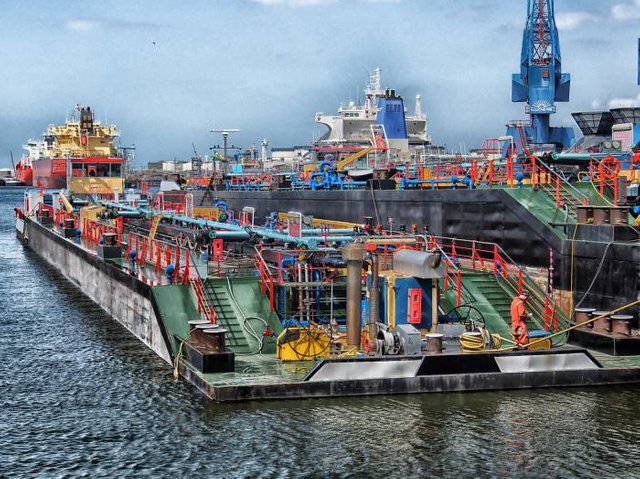How Blockchain can revolutionize shipping
We have come a long way from the crowded ports filled with stevedores unloading thousands of sacks from ships.
The 1960s saw the arrival of containers that offered much greater efficiency in the transportation of goods – in terms of both manpower, security and storage.
This was a game-changer – but modernisation didn’t stop there. Ports around the world have invested heavily to ensure the shipping industry can handle large volumes at greater speed.
Port technology
The London Gateway terminal is a classic case in point. The terminal, built over an area of 175ha, has a quay length of 2,700m and can accommodate the largest cargo vessels of up to 18,000teu.
The terminal is equipped with the automated container handling equipment, advanced vehicle booking systems, automated optical character recognition (OCR) for the road gate system and automatic stacking of cranes using OCR.

Modern ports have dramatically speeded up cargo handling but related document handling remains complex and slow.
London and other modern ports around the world also have huge computer databases tracking cargoes.
While this all very impressive in terms of the physical movement of cargo, the shopping industry still depends on the processing of many millions of paper documents.
Forms need to be completed and approved before goods can enter or leave a port. A single shipment can require hundreds of pages to be physically delivered to a various authorities, banks and customs bureaus.
The Blockchain solution
The potential solution to this colossal challenge is Blockchain. Document processing that might previously have taken days could be done in minutes – with no need for human input (or risk of human error).
In terms of the costs of moving cargo across the world, they could drop dramatically.
Blockchain could turn the whole processes paperless with cargo sellers/buyers, shipowners, charterers, banks, agents, customs, port authorities able to store information in encrypted format and securely exchange payments.
Smart contracts
Another key benefit blockchain brings to the shipping industry is ‘smart contracts’. That is contracts in the form of a computer program which automatically implements the terms and conditions of any agreement between relevant parties.
Essentially, the contract will be published by the owner (or charterer) with the other party negotiating the price/freight costs directly via the blockchain network.
Smart contracts carried out by a computer network automate calculations, approvals and other transaction activities. Prior to blockchain, such a contract was not feasible because parties to an agreement maintained separate databases.
With a shared database that runs a blockchain protocol, the smart contracts auto-execute, and all parties validate the outcome instantaneously. This represents a massive time and no doubt financial saving.
In short, adopting Blockchain technology could revolutionize the industry since the electronic ledger system allows transactions to be verified autonomously. However, progress will not be easy.
To work, numerous shipping lines and thousands of related businesses around the world – from manufacturers and banks to insurers and port authorities — will have to integrate all new systems onto one single platform.
The problem is that not all entities involved will necessary be looking to deploy the same blockchain solution which makes trading via a common platform difficult to achieve.
This is not to say that some progress can’t be made or that the incentive to ‘standardise’ is not attractive.
Pilot projects
Shipping names are already experimenting with Blockchain technology. APL, owned by the container line CMA CGM, in partnership with brewer Anheuser-Busch InBev, management consultant Accenture, a European customs organization and other companies, announced recently that they’d tested a blockchain-based platform.
According Danillo Figueiredo, Vice President of international logistics at AB InBev: “Blockchain technology will be transformational to our business and the world. It reduces mistakes, digitises information and improves the supply chain process so we can focus on our core business of brewing the best beers for consumers.”
South Korea firm Hyundai Merchant Marine has also held trial using a Blockchain system developed with Samsung SDS. Hyundai Merchant Marine reported that all data collected on the ship was logged onto the blockchain from start to finish. In addition to maintaining logs, the technology was also used to issue documents while ensuring that the import and export records were not altered.
According to Samsung SDS, the implementation of a blockchain streamlined the workflow for Hyundai.
The initial pilot test was on a container ship sailing from Korea to China. Other voyages were subsequently recorded as part of the pilot in India, the Middle East, and Europe.
Maersk, the container shipping giant, has also joined forces with IBM to use Blockchain technology to track cargo and documents in real time.
The technology should help reduce or eliminate fraud and errors and minimize the time products spend in the transit and shipping process.
In 2014, Maersk conducted a study which found that a simple shipment of refrigerated goods from East Africa to Europe passed through nearly 30 people and organizations, with more than 200 different communications among them.

Shipping companies are increasingly starting to understand that Blockchain technology is essential to industry efficiency.
Potential benefits
Clearly the shipping industry, if not exactly embracing Blockchain, is waking up to the potential it offers.
A report from Bloomberg reveals that Maersk has reached an understanding with Singapore-based port operator PSA International and APM Terminals, based in Holland, to use its platform.
APL and Accenture also point to successful pilot shipments utilising Blockchain technology.
But the success of Blockchain in the shipping industry depends on a great deal of joined-up thinking and a concerted effort to work together to drive efficiencies across the board.
According to K D Adamson, chief executive officer of Futurenautics Group, (a specialist adviser on digital strategy) shipping needs to stop thinking about itself as this standalone middle sector. He told Bloomberg: “It needs to start thinking about how the different elements of shipping fit.”
Text by Dave Burrows
Source: https://dex.openledger.io/how-blockchain-can-revolutionize-shipping/
Follow OpenLedger!